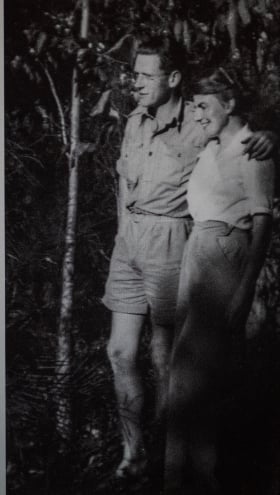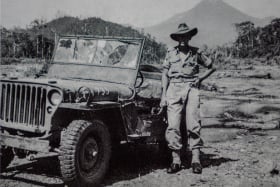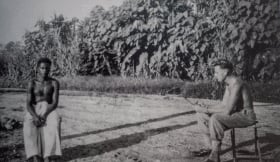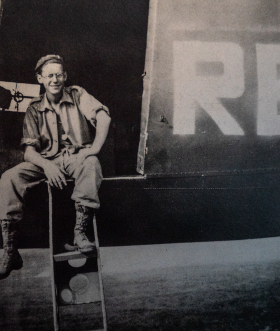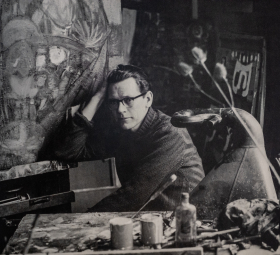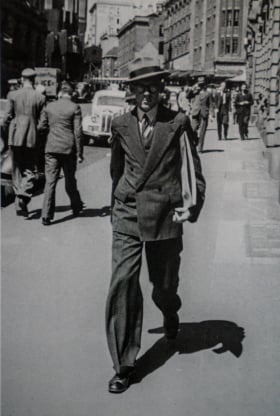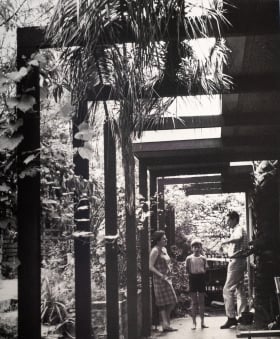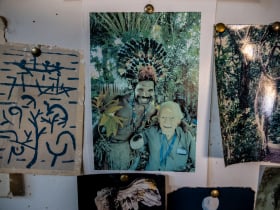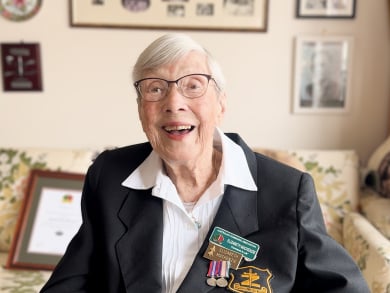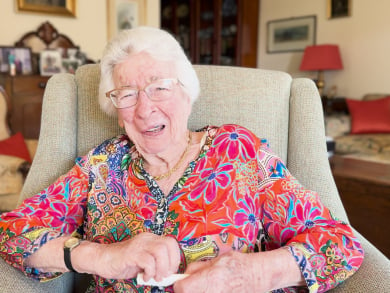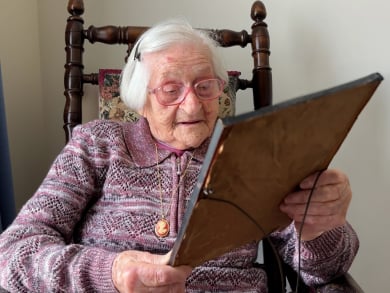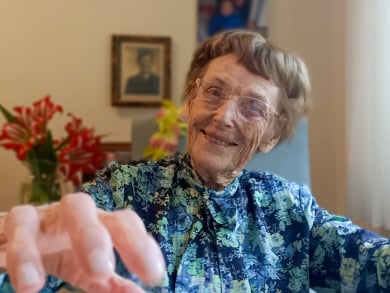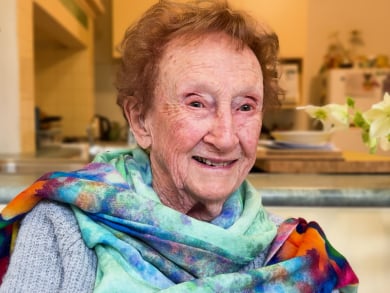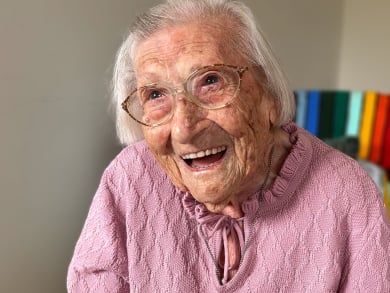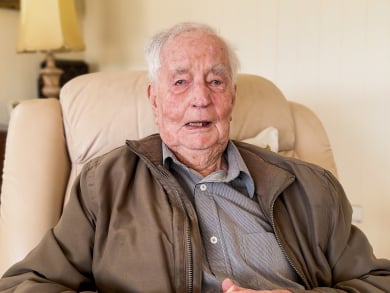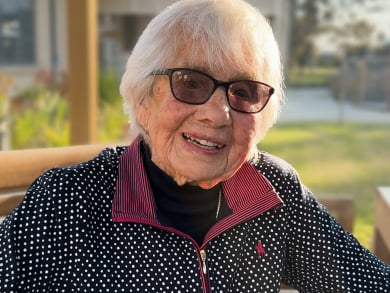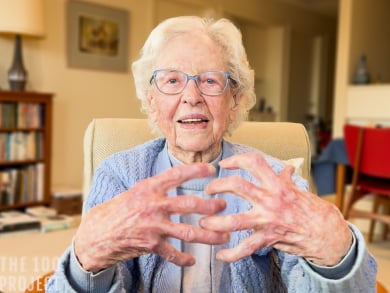When I lay in bed...
I mean I mean this very seriously.
I actually speak to myself.
I say, “Stop looking backwards.
Look forward”, because
there is no point in looking back
and regretting all those things.
So I say to myself, “Look forward”.
What I really mean is that
get off your backside and go into
the studio tomorrow and do some work.
Look forward, don’t look back.
My name is Guy Warren.
Guy Wilkie Warren
if you want the full name.
I am 101 years old
and I was born in the city of Goulburn
in 1921
I have extraordinary good, like
most old people I think, long term memory.
I can remember being in Goulburn
as a child.
I can remember being in a pram
in the main street of Goulburn.
I had
one, two, three, four...
four or five maiden aunts
and they were maiden
because they never married.
And they never married
because all the young men
in Goulburn
had been killed in the First World War.
And the story I heard was that all
the Goulburn boys were in the boats
that first went into Gallipoli.
Whether that was true or not,
I don't know.
But what I have seen
many times later,
wandering through the bush,
wandering through the country,
driving around.
I used to at one stage often
stop at the local cemetery
in any country town,
and if you do, you find one
name and six people with that same name.
And they were all boys
from the local farm.
And one joined up
and then the next one grew
up a bit and he joined up,
and then six of them joined up.
Appalling.
My mother was born
into a very large family in Goulburn
and when she was born
there was something like eight kids
I think.
I forget the number now,
but I know it was a big family.
And there was measles in the family.
All the other kids had measles
and when the new baby arrived,
obviously they didn't
want to have a new baby in the house
if there was measles there,
so they gave the baby to
an elderly aunt.
What would have been to me a great aunt.
I think.
And they reared her.
They never gave the baby back.
That's Aunty Fanny’s house and that's
the house I was born in, in Goulburn.
That’s my Mum
with a violin in her hand
by the look of it
and that’s her playing piano.
And she was a very good singer.
She learned the piano,
she learned the violin,
and she was good at all those things.
And Dad was a pianist.
So obviously that's how they got together.
Okay, well,
that photograph is of the Empire
Theater in Goulburn
where my old Dad played the piano.
And that's my Dad.
The cinemas in those days, of course, were
like extraordinary theaters.
They were magnificent pieces
of architecture
and razzmatazz.
And he was the pianist and
in the days of
no talkies, when
all the spoken words were written
on the screen in front of you,
there was no sound.
In order
to have music and appropriate music,
there was always a pianist
and usually a small orchestra.
And Dad was such a pianist.
Mum was the violinist.
And I know Dad had,
when Mum could no longer could do it
or had kids to look after,
he had a small group with him.
You don't ask questions to your parents,
which is a great shame.
You don't know the questions to ask,
of course.
But we moved. We never owned a house.
We moved every two years
and we moved to every suburb in Sydney
and in retrospect
I would guess it was because
Dad had a two year contract
with the cinema.
I remember in primary school
being very proud of the fact
that I could point to the flier
which said,
‘Playing at the local cinema was Leonard
Warren and his...’
whatever they were called, and saying,
“That's my Dad!” Big deal.
Poor Dad.
Talkies came in, of course, exactly
in the depths of the Depression.
So he got a double whammy.
He lost
his job because the talkies came in
and it was right
in the depths of the Depression.
Poor devils.
They really struggled after that.
Yeah, we've been lucky.
I've been lucky.
They were tough times.
One in five people were out of work.
My memory of the Depression is of
lines of out of work
blokes on every street
corner in Sydney, particularly musicians
who are the first people to feel
the rigors of
being out of work.
Nobody wants to
pay a musician.
My memory of Sydney is of a muso on
every street corner, busking for a living.
And on the rocks
around the eastern suburbs of Sydney,
I have a clear memory of
out of work fellows
who'd saved a bit of
timber that had washed ashore
on the rocks and had built
huts.
Somehow they must have made them
waterproof.
They certainly couldn't
have made them warm.
I had to leave school at 14 to
earn a little bit of money to help them,
I guess,
although the pay was so poor
that I can’t
believe that it helped them very much.
But I always regret having to
have to leave school at 14.
That was much too early.
And my brother, of course,
who wanted to be a doctor,
never had the chance to do that.
But these things happen.
You know, that's part of living,
part of life, part of the world.
I can remember
when I was 14 and that was in high school.
I was just leaving high school.
Mum always managed to have a Sunday roast.
I don't know how she did,
but I do remember that
half a leg of
lamb was a shilling.
How do I remember that? Somebody...
maybe she or maybe somebody told me that,
but a shilling that's...
well, what's ten cents now.
I can remember
breakfast that my brother and I
had, having gone
for a swim in the morning, and come back.
And there were
big sandwiches of bacon
and a bacon sandwich
and a sunny morning in summer
after a swim.
Man, that’s really living!
It really is.
Why don't I do it now?
I'll have a sandwich tomorrow.
Bacon sandwich tomorrow.
Through somebody who knew somebody
who my parents knew,
I got a job as a proofreader’s
assistant on the old Bulletin newspaper.
It was a weekly newspaper,
and the old Bulletin had a reputation
as being a farmer's country magazine.
The proofreader in those days
was fairly powerful.
He wasn't a journalist.
He was a proofreader,
and he'd checked every proof
for mistakes.
In a funny way,
I probably got a very good education,
at least in English from him,
because I was his assistant
and I had to read out
the journalist's copy
while he checked all the proofs.
So I don't regret that
except that I think I was there too long
and I was fascinated by the journalists
and I liked using words,
so I wanted to be a journalist
and I started writing bits
and pieces for them.
But I was particularly interested
in the fact that
the bulletin
didn't have any resident artists,
but its pages were full of jokes.
All the jokes and all the drawings,
of course, were drawn by
outsiders, by freelance artists.
They weren't done by artists
who were on staff.
There was only one guy on staff,
and he was the guy
who actually collected the drawings
and spoke to the artists.
And I saw these guys coming in
every Thursday
I think it was, with their jokes.
They'd disappear into his room
and the door would close
and there'd be great roars of laughter.
And then they'd come out half an hour
or an hour later
with a little bit of paper in their hand,
and they'd go to the front desk.
This was at 252 George Street,
and they'd go to the front desk
and swap their bit of paper for a cheque.
Then they'd go out onto George Street,
turn right, and go into the nearest pub,
which was next door.
And I thought, “Gee, you know,
that's a pretty easy life”.
So I thought I ought to be an artist.
I'd always drawn anyway.
I'd always wanted to draw.
So I started bombarding the art editor
with joke
drawings,
and they were obviously very bad.
But bless his heart, he was very kind.
And he didn't do
anything about it.
He didn't
say anything until one day he'd
obviously had a bad day.
He said, “You don't do it like that.
You do it like this!”
And he grabbed my bit of paper
and he took a pencil
and he drew something on the paper.
I can still remember his drawing.
It was a damn sight better than mine.
And then he grabbed me by the arm,
literally grabbed me by the arm,
dragged me out of his office,
up the steps, into the main
office, down the steps,
into George Street.
Up George Street to a little street
on the right, the name of
which I've forgotten.
It was full of old colonial type
buildings.
He went into one about halfway up
the street
and took me upstairs
to about the second floor
of this old building
and threw me through big swing doors
and said to the bloke inside, “Teach
this kid to draw”.
And then the art editor buzzed off
and left me there.
And it was a little private school run
by somebody called J.S. Watkins,
who was a trustee of the Art
Gallery of New South Wales.
He was a painter and a good painter.
It was
a traditional school with a tradition
that goes way back to Leonardo.
It was about seeing
and putting down what you see
and the skills that you need
with which to do that.
It was nothing about
imagination or investigation or
excitement.
It was straightforward
drawing and painting what one sees.
It was a skill.
It was skill oriented.
And I was grateful for it.
And I had a very good basis
in exactly that.
And that meant that I left the Bulletin
because they sacked me when I was 21.
Lousy creatures.
I thought I might have gone on
and become a journalist.
But anyway, they obviously had enough
journalists and they didn't want me.
So at 21 I decided...
things were getting a bit hectic then,
so I decided to join the army.
The Japanese at the time were battering
the door down in Darwin
and, at a moment of patriotism, I decided
I ought to do something about it,
so I joined the army.
But what that meant was,
by the time I went into the Army, I had a
lot of skill in drawing.
Being in the army on the whole
is awfully boring
because you might be frantically busy
sometimes doing all sorts of awful things,
but there are times
when you do absolutely nothing and blokes
sit down and play cards,
which always bored the hell out of me.
But I could draw them playing cards
and I could draw them anyway.
I remember I used to draw all my mates.
In fact, I think at one stage,
in New Guinea, I used to charge them
for drawing them, which
showed a degree of acumen that I
don't seem to have followed since, sadly.
But it was fun.
And by sheer chance,
I didn't get it out for you,
on my table here in front of me,
is an old sketchbook
which has on it
‘Bougainville Sketchbook 1940s’.
And I served for a few years
on the island of Bougainville,
a couple of hours
flying time east of New Guinea.
And these are some of the things that
the War Museum has.
These are
drawings of Japanese
which, bless them, they photographed
and let me have photographs of them,
so I haven't lost them entirely.
They’re in the museum
and I have good photographs of them.
And I still think they’re damn good.
Well, he's obviously not a Japanese.
He was a fellow soldier,
a fellow sergeant.
And that's one of the Japanese.
They’ve all written their names on them.
I asked them to do that.
How I did that, I can't imagine.
I guess by sign language,
but I've had them translated since
and they are indeed proper names,
which intrigues me because in a similar
in an opposite situation,
an Australian prisoner of war
would have written ‘Ned Kelly’.
But these guys wrote their proper name.
They were much more disciplined
than our lot.
Oh I won’t to go through it all.
A lot of landscapes and a lot of a lot
of local indigenous people.
And I was
always intrigued by the way they
decorated themselves,
not only their tribal decorations,
but if you gave them anything,
they would put it in their hair
or in their lap-lap, or they would...
it became somehow a part of their body.
And I quote one particular time
when drawing a big black guy,
and the guys in Bougainville
are very, very, very black,
they're the blackest in the South Pacific,
and I had
I used to pay them with cigarettes
or tobacco or something like that
and I had nothing with which to pay him.
So I went into my tent
and found a tin of talcum powder,
a pretty unlikely thing to have,
but the Comforts Fund had sent up
tins of talcum powder because they thought
it would help skin disease.
I don't think anybody ever used it. But
anyway, I found a tin in my tent,
so I took it out and gave it to him.
He immediately opened it,
poured it into his hand,
and made these wonderful, great marks,
white marks on his big black body.
And I thought, “Wow,
only an artist would do that.
That's great”.
Anyway,
that image has stayed with me ever since.
And there was another related incident
which added to that
which happened... 10, 15 years later.
After I'd
come back to Australia, I did a course
at the National Art School, which was then
called the Sydney Technical College,
and that was an art course.
And then I married
and my wife and I went to London
looking for a job
and I got a job,
and so did she, in those
days and we had a little flat
just out of London.
And this was the early days of television
and we had a little black
and white television set.
And I saw a documentary by some person
who'd been in New Guinea, in the highlands
of New Guinea at Mount Hagen,
where there was an annual...
there was in those days,
an annual dance festival.
And dancers come from all over
the South Pacific, from all the islands,
and they dressed themselves
in the most outrageous clothes.
But all local material.
They used feathers,
plants,
anything you can think of...
mud, anything at all, which become
fancy dress, if you like, dance dress.
And the thought suddenly
occurred to me
that what these guys are doing
is not just dancing,
but by using all this material,
which is local indigenous material,
what they have around them,
what they are really doing
is making a statement
about belonging to their land,
not somebody else's land, their own land.
And I thought, Gee, I'd like to have
some of those photographs.
So I wrote to the BBC and said
something like, “I'm an Australian artist
living in London,
drawing my memories of New Guinea,
painting my memories of New Guinea”.
And whoever got the letter
probably thought, Well, here's an idiot,
you know, who would want
to paint New Guinea from London?
So he may have passed the letter around
for all I know.
Anyway,
about a week later
I got a phone call from somebody and
he said he was from the BBC and he thought
he might be able to help me.
He said he did have some photographs
from the documentary
that I had been looking at,
but he wouldn't sell them to me
as I wanted him to.
He said he'd lend them to me,
but he introduced himself over the phone
and he said his name was David
Attenborough.
And would I like to come around
for a drink?
Well,
David wasn't well known in those days.
He was just a bloke from the BBC
with a name as far as I was concerned.
So my wife and I went around for a drink.
It's odd, isn't it?
The little things that one remembers.
Totally, totally,
utterly insignificant things.
Why the devil should one remember them?
Because we sat down in his lounge room
and he said, “What
would you like to drink?” And my wife said
she'd have a gin and tonic.
And I said, “I'll have a whiskey.”
And so he poured me this small whiskey.
And he said, “What do you like in it?”
Meaning you know, water or soda
or whatever.
And I said, “Well,
actually I prefer it neat”.
And then he looked at me and said, “Oh,
well,
you'd better have more than that”
and he went...
I mean, why should I remember that?
I still keep in touch in touch with David
very occasionally.
And he sent me a note
for my 100th birthday, which
was a great thrill.
Bless him.
Well, springing
from those two connections with land.
First of all, with that
connection
with the fellow in Bougainville.
And secondly,
after talking to and listening to David,
not only when I met him,
but subsequently all his...
all his programs,
and also a better understanding of our own
Aboriginal attitude
towards land, our own Indigenous
people's attitude towards land.
Maybe
it's a romantic idea.
I don't care. I like the idea anyway.
I like the idea of us
belonging to the land,
belonging to the universe,
not owning it, for God's sake.
We don't own it.
We are part of it.
And what I frequently do
is to inhabit my landscapes with figures
which don't necessarily
have to look as though they're
in the
painting to give it scale
or to give it interest.
But looking as though they're
as real and as insignificant
as a tree beside them,
as though they're part of
whatever it is they're in.
If you're in a thick rainforest,
you are there and that's it.
It does take over you. You are part of it.
And the vines, the lianas, that
wind their way through it and around
you and everywhere.
You're captured by it.
You are part of it.
Anyway, it's like
the lianas are like
three dimensional
drawings,
just weaving through space.
Look, I don't...
I'm not dogmatic.
One of the
great American painters
whom I respect enormously
said, among other intelligent things
he said,
“Art can contain anything, anything at all
except dogma of any kind”.
So I don't want to be dogmatic,
and I do do other things.
I don't always follow my own rule.
There are no rules to this crazy game.
It's about expression.
One should be able to...
An artist needs to be
curious.
We all need to be curious.
We ought to ask questions.
Is there a better way of doing this?
Why can't I do it this way?
Who says I can't do it that way?
One should be
capable of
doing,
painting anything one wants to.
